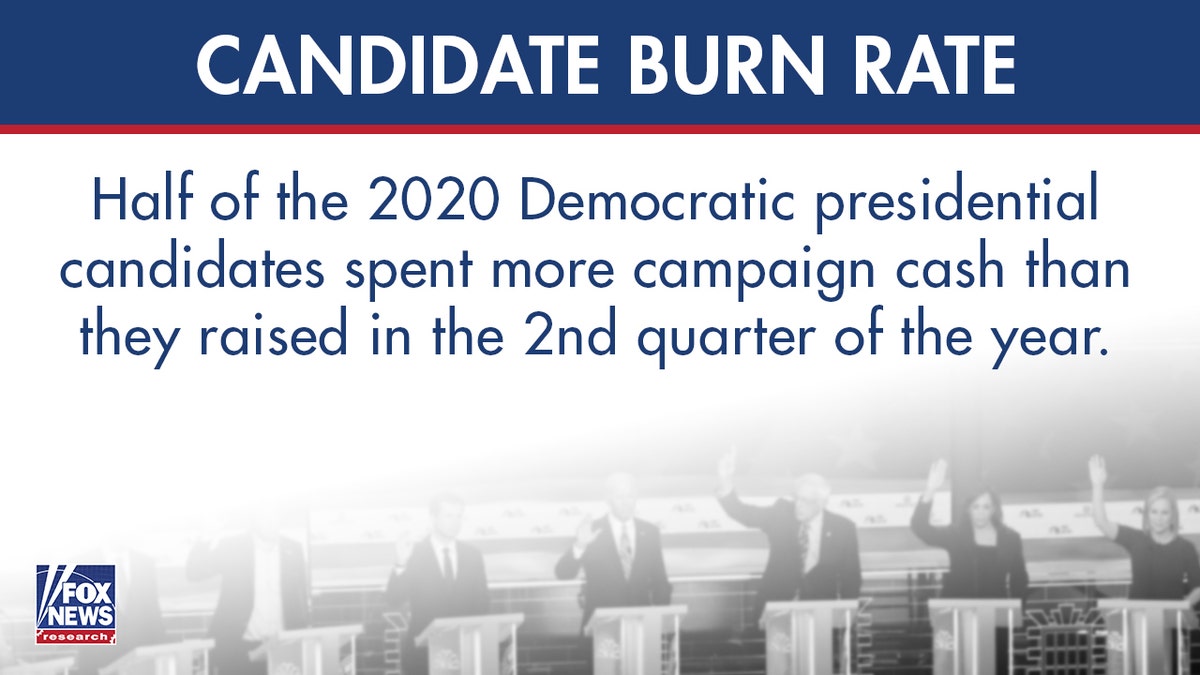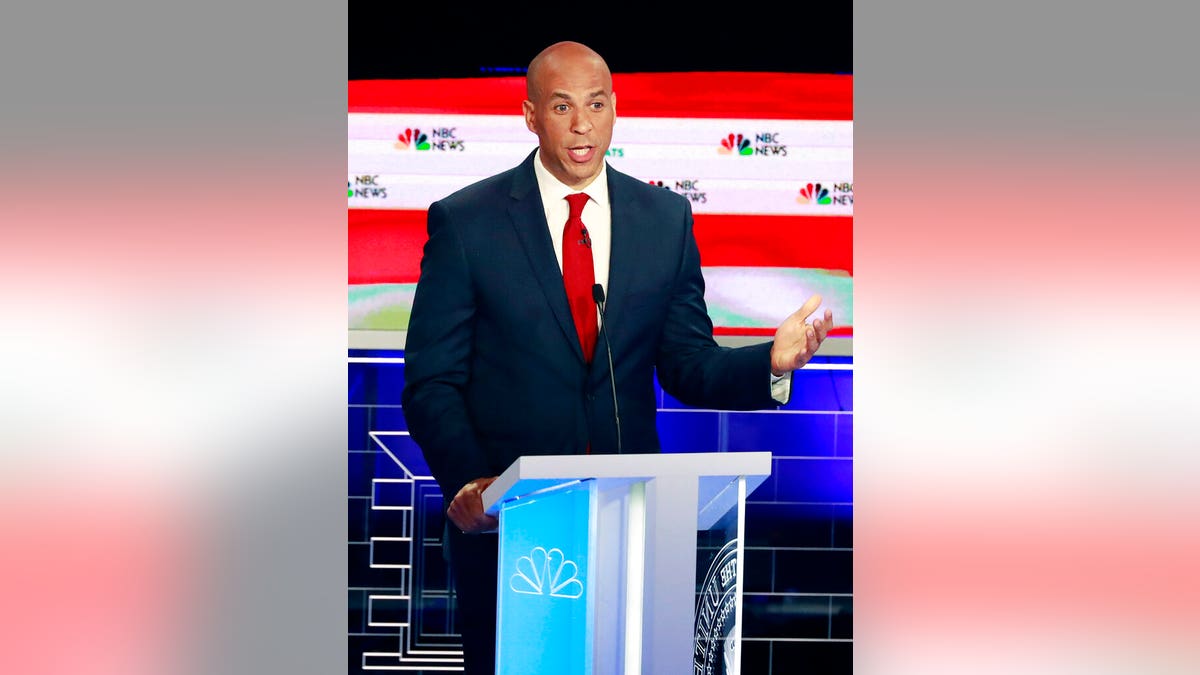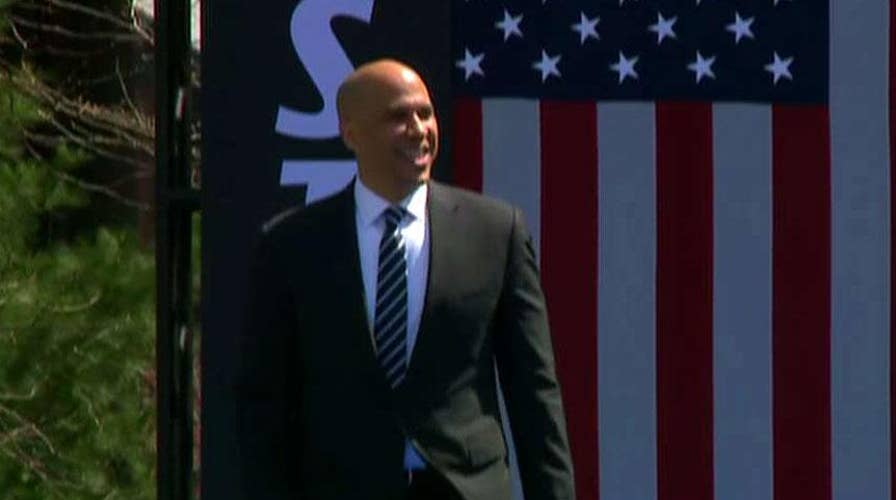Candidates release 2019 Q2 fundraising totals
South Bend, Indiana Mayor Pete Buttigieg out raises all other 2020 Democratic hopefuls in Q2 of 2019.
The presidential candidates are off to the races, speaking to voters, visiting small towns -- and burning through cash reserves faster than donors are giving.
In the last fundraising quarter, nearly half of the Democratic presidential candidates spent more than they raised in donations. Campaigns with high "burn rates," as the deficits are known, usually need to make a big splash during debates or on the campaign trail to attract new donors and maintain a viable financial picture.
FIELD LOCKED IN, BUT STAGE IS STILL IN FLUX, FOR ROUND 2 OF DEM DEBATES
Among those with the highest burn rates, according to Federal Election Commission records, are New York Sen. Kirsten Gillibrand, former Texas Rep. Beto O’Rourke, New Jersey Sen. Cory Booker and Hawaii Rep. Tulsi Gabbard. Former Maryland Rep. John Delaney was also listed as having spent several million more than he raised, but the candidate has since said the numbers were misreported.
Highest burn rates, second quarter
Kirsten Gillibrand:
Raised $2.3 million. Spent $4.2 million
Beto O’Rourke:
Raised $3.6 million. Spent $5.3 million
Cory Booker:
Raised $4.5 million. Spent $5.3 million
Tulsi Gabbard:
Raised $1.6 million. Spent $1.9 million
While all the candidates still maintain substantial amounts of cash on hand, running a deficit this early into their campaigns is not usually a harbinger of a successful race, observers say.
“It’s never a good sign,” Larry Sabato, director of University of Virginia’s Center for Politics, said. “I’m not going to write them all off, let’s see what happens in the second debate.”
Delaney, for instance, has large cash reserves, albeit through his own personal fortunes. To date, he's loaned his campaign $24 million. He's polling at 1 percent.
Sabato, who runs Sabato’s Crystal Ball through the university, said that money isn’t the most important aspect of a presidential campaign, but it’s certainly an essential component.

Among the candidates flagging in the polls and cutting deeply into their coffers is O’Rourke. The most recent Morning Consult poll, released Monday, had the former congressman polling at 3 percent nationally. His campaign spent $5.3 million in the last quarter and only brought in $3.6 million. The Texas Democrat still has more than $5 million on hand thanks to strong fundraising early on, but observers say he likely can’t run in the red for too much longer and remain viable.
“I would say that for O’Rourke, and several of the others really, a stellar debate performance is essential,” Sabato said. “No one could watch his campaign and say that Beto O’Rourke was doing really well. He’s not. They expected a lot more than this.”
O’Rourke, who generated national enthusiasm for his 2018 senate campaign against Texas Sen. Ted Cruz, has struggled for attention in the crowded primary since shortly after launching his bid for the White House this year.
Sabato said South Bend, Indiana Mayor Pete Buttigieg has cut into O'Rourke's popularity with young people and Sens. Kamala Harris of California and Elizabeth Warren of Massachusetts have cut into his progressive appeal.

Democratic presidential candidate former Texas Rep. Beto O'Rourke gestures during a Democratic primary debate hosted by NBC News at the Adrienne Arsht Center for the Performing Arts, Wednesday, June 26, 2019, in Miami. (AP Photo/Wilfredo Lee)
None of those candidates ran a deficit last quarter, and each raised at least $11 million – with Buttigieg leading the trio with $24 million in donations. Warren followed with $19 million in donations. O’Rourke has yet to tap into his massive $80 million war chest amassed during his Senate run against Cruz.
O’Rourke is running a campaign he says is supported by grassroots organizing and donations. The bottom-up efforts are apparent in their early state operations. According to a press release from the campaign, they’ve recently opened 11 field offices in Iowa and massed more than 100,000 volunteers across the country.
"You have to add Trump and the RNC together, [Democrats] are nowhere near that total. ... They’ve been raising money all along and banking it.”
A source in the O’Rourke campaign said the campaign is planning to grow its New Hampshire team after a period of expansion in the state. They also say they have the resources they need, largely from more than $13 million raised in the first four months after Beto’s announcement.
Contributions, the source said, come from nearly 200,000 individual donors from every state. They said many of their donors are teachers, students and nurses.
Booker, too, is playing a long game when it comes to donors and polling, though how successful remains to be seen. His campaign, which is based on ideas of unity and focused on a building a coalition of voters across demographic lines, says it pulled in 72,000 new donors in the second quarter.

Democratic presidential candidate Sen. Cory Booker, D-N.J., speaks during the Democratic primary debate hosted by NBC News at the Adrienne Arsht Center for the Performing Art, Wednesday, June 26, 2019, in Miami. (AP Photo/Wilfredo Lee)
Unlike Beto, Booker has tapped into the money from earlier Senate runs. In the second quarter alone, he pulled $2.7 million from his Senate campaign. In total, he’s transferred more than $3.6 million to his presidential campaign.
His campaign spent a total of $5.3 million in the second quarter, but raised $4.5 million. Fellow Sen. Kirsten Gillibrand spent $4.2 million, but raised $2.3 million.
CLICK HERE TO GET THE FOX NEWS APP
Sabato sees the heavily populated Democratic field as a potentially fracturing force during the general elections. He said there are degrees to voters’ support and, even if they coalesce to vote for the eventual Democratic nominee, they might not open their pocketbook for donations. Such an outcome may weaken their ad-buying and campaigning power in a contest against the president.
“You have to add Trump and the RNC together, [Democrats] are nowhere near that total,” Sabato said. “They’ve been raising money all along and banking it.”
Although the Republican National Committee and the president have raked in donations – Trump alone to the tune of $56 million – Sabato said the general election is far from a foregone conclusion.
“I don’t believe in the end that money will be the factor that determines the elections. … It’ll be the candidates and the conditions of the election year,” like the economy, scandals surrounding the candidates, and the policies they adopt, Sabato said. “It’ll be the big things that normally determine elections.”




